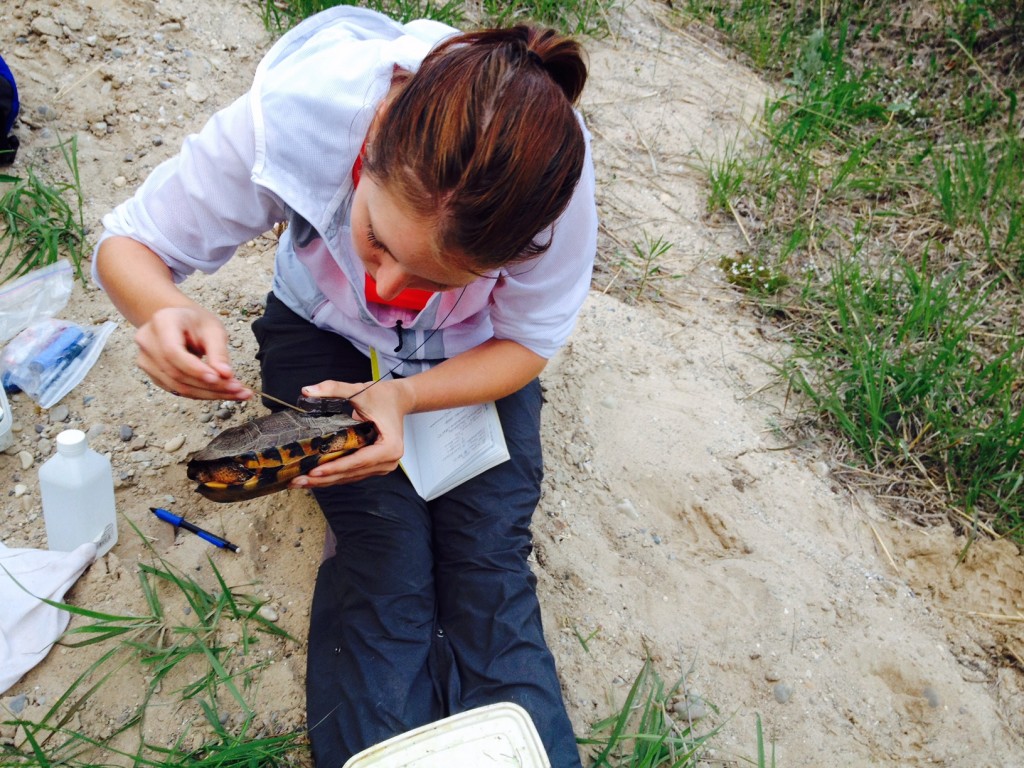
Senior Lauren Mitchell will never forget the summer she met Tippy the turtle.
She named him Tippy because she had to “tip” her kayak to get him out of it after he crawled to the tip. For Mitchell and other members of Team Turtle, however, Tippy is just one of the many turtles St. Thomas students track and study in northern Michigan.
“We’re not really supposed to name them,” Mitchell said. “But you end up naming them based on their personality. We were in northern Michigan catching turtles. There wasn’t exactly a lot going on.”
Team Turtle is a group of students led by Tim Lewis, chair of the biology department. Lewis has been studying turtles for more than 20 years and believes getting students involved in actual field research is invaluable.
“I realized by tracking one turtle that there was remarkably little published research on turtles,” Lewis said. “Students love working on the turtles and being out in the wetlands.”
Lewis and the students also track and research turtles all year at Lake Judy. Every summer Lewis sends two dedicated students to Michigan to conduct independent field work with grant funding from the U.S. Fish and Wildlife Service. The students receive a stipend, live in government housing and spend hours in the field tracking and monitoring turtles.
Mitchell and senior Elizabeth DelMain both agree the experience was outstanding. Mitchell spent the summer in Michigan in 2013.
“It’s all good to learn about things in class and lab, but when you actually get out into the real universe you need to start dealing with all these variables like weather,” Mitchell said. “Getting to actually be out in the field and work with other professionals and a government agency… getting to do all of that is much different than being a lab where you wear closed toed shoes. You get a dose of reality.”
DelMain, who plans to go to medical school, spent last summer with Team Turtle. She said even though she’s not studying to become an ecologist, the skills she gained are applicable.
“It was probably one of the most beneficial experiences that I’ve had,” DelMain said. “It definitely gave me a different perspective on how things are done.”
Both students emphasized they learned things that they could never learn in the lab.
“You learn so much more about experimental design and performing studies when you’re actually doing one than from reading about one or doing the step-by-step lab where it’s all spelled out for you,” DelMain said.
Mitchell added that breaking out of her shell and doing independent research was a huge confidence-booster.
It’s for these reasons that Lewis pushes students to get involved. Not only does the project give them an adventure, it builds their skills and experience for future opportunities.
“Research experience helps you get into graduate school, into medical school, all those kinds of things. You learn to write scientific papers, you learn to think like a scientist, you learn to handle problems that nobody anticipated because nobody’s done this before,” Lewis said. “Any employer wants that. They want problem solvers, they want people who can think outside the box, they want people that can work with others.”
Lewis, who has been studying turtles for the majority of his career, said he probably learns more from the students than they do from him.
“Students teach me so much. I don’t just teach them. I learn a ton,” Lewis said. “You could pick absolutely anybody’s research and get the same story. Students help you see things differently and getting really good experience.”
Lewis first began studying turtles after he stumbled upon an unusual and unexpected mass of of them while tracking one. When he searched for information about his find, he discovered there was remarkably little research on turtles. Additionally, Lewis said he doesn’t find the age-old study of mice that interesting.
Ever since Lewis began his research, he and his students have been breaking through the uncharted shell of turtle behaviour – something exciting for everyone involved.
“I’m still finding stuff out. My students, undergrads, finding out stuff that nobody in the world knows. New stuff. That’s why I’m doing turtles,” Lewis said. “When you get an undergrad who’s not repeating the same work everyone has done but is finding something new – thats cool.”
Conducting research of this magnitude is both thrilling and scary for the students.
“It’s exciting but it’s also kind of terrifying,” Mitchell said. “There’s no one checking my work. There’s no one who can say ‘do it this way, this way would be better.’ There’s no right answer. It’s ‘well that’s weird and I don’t know, so we’ll figure it out.’ It’s exciting. It’s scary, so you just kind of have to trust yourself.“
DelMain agreed.
“It’s weird,” she said. “Someone was joking that Matt and I became essentially experts in this field because we were the only ones who knew what was going on and what these turtles were doing. Realizing that you’re one of a handful of people that knows something that no one else does is really strange but at the same time, I’m an undergrad. It’s kind of cool to be a part of something new. It was fun.”
Some of Team Turtle’s data about major discoveries regarding turtle migration and nesting patterns is being used by the U.S. Forest Service to protect turtle populations.
“I got to start a new branch of research,” DelMain said. “We looked at nesting for the females, trying to see where they lay their eggs, what the environment is like, sand, south slopes.”
She said it was amazing to see her work being used to make a difference.
Lewis plans to continue his research and keep working with students for at least another decade.
“I’ve had English majors (and) psychology majors. I don’t care what their major is,” Lewis said. “I care that they want to research and learn about turtles.”
Simeon Lancaster can be reached at lanc4637@stthomas.edu

